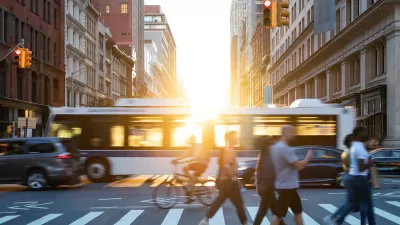If approved, the proposed regulations would require developers to implement policies to reduce single-occupancy vehicle trips for new developments.

A proposal before Denver's city council would "would require developers to implement specific programs to reduce the number of single-occupancy vehicle trips taken by tenants of new developments," writes Conor McCormick-Cavanagh in Westword. The plan calls for creating a set of transportation demand management goals that developers must consider when planning new construction. "For example, the proposal suggests, developers could offer subsidized transit passes for tenants or install showers, lockers and changing rooms for people who bike to work."
According to Alana Miller of the NRDC, who has been working on a transportation demand management proposal with the city's Department of Transportation and Infrastructure (DOTI), "there are benefits from a climate perspective, from air pollution, public health and affordability. It gets at quality of life and how Denverites have access to get around the city and go about their daily lives and do that in a more sustainable, accessible and affordable way." If approved, the rules would apply to all new commercial, residential, industrial, or office developments over a certain size.
The proposed rules intentionally give developers many options. "There’s tons of different transportation demand management strategies that can be implemented. And developers want to choose a strategy that makes sense for their building, their location and their tenants,' says Matt Kaufman of Urban Trans North America." But the plan's authors insist "this program does have teeth" and includes "compliance requirements and enforcement mechanisms." Other cities and counties such as San Francisco and Virginia's Fairfax County have adopted similar programs to reduce congestion and demand for single-occupancy car trips and improve opportunities for walking, biking, and public transit.
FULL STORY: Denver Wants New Developments to Help Reduce Cars on the Roads

Maui's Vacation Rental Debate Turns Ugly
Verbal attacks, misinformation campaigns and fistfights plague a high-stakes debate to convert thousands of vacation rentals into long-term housing.

Planetizen Federal Action Tracker
A weekly monitor of how Trump’s orders and actions are impacting planners and planning in America.

In Urban Planning, AI Prompting Could be the New Design Thinking
Creativity has long been key to great urban design. What if we see AI as our new creative partner?

King County Supportive Housing Program Offers Hope for Unhoused Residents
The county is taking a ‘Housing First’ approach that prioritizes getting people into housing, then offering wraparound supportive services.

Researchers Use AI to Get Clearer Picture of US Housing
Analysts are using artificial intelligence to supercharge their research by allowing them to comb through data faster. Though these AI tools can be error prone, they save time and housing researchers are optimistic about the future.

Making Shared Micromobility More Inclusive
Cities and shared mobility system operators can do more to include people with disabilities in planning and operations, per a new report.
Urban Design for Planners 1: Software Tools
This six-course series explores essential urban design concepts using open source software and equips planners with the tools they need to participate fully in the urban design process.
Planning for Universal Design
Learn the tools for implementing Universal Design in planning regulations.
planning NEXT
Appalachian Highlands Housing Partners
Mpact (founded as Rail~Volution)
City of Camden Redevelopment Agency
City of Astoria
City of Portland
City of Laramie





























